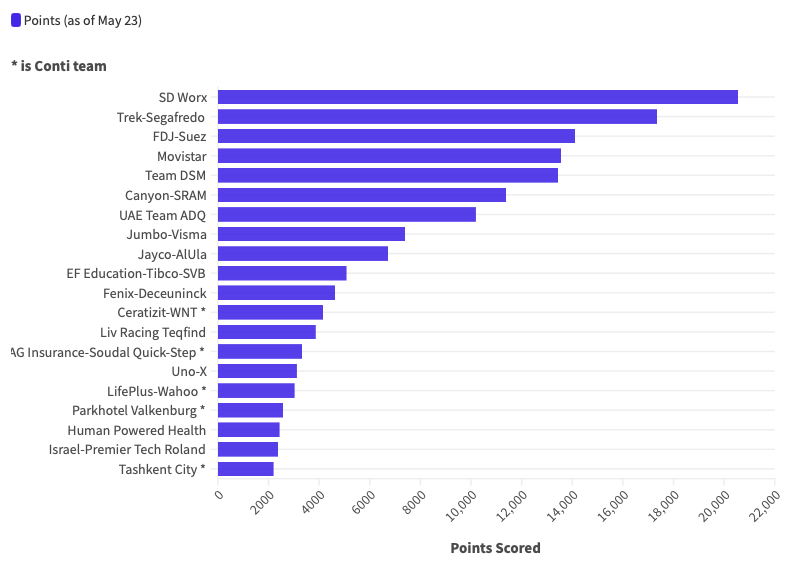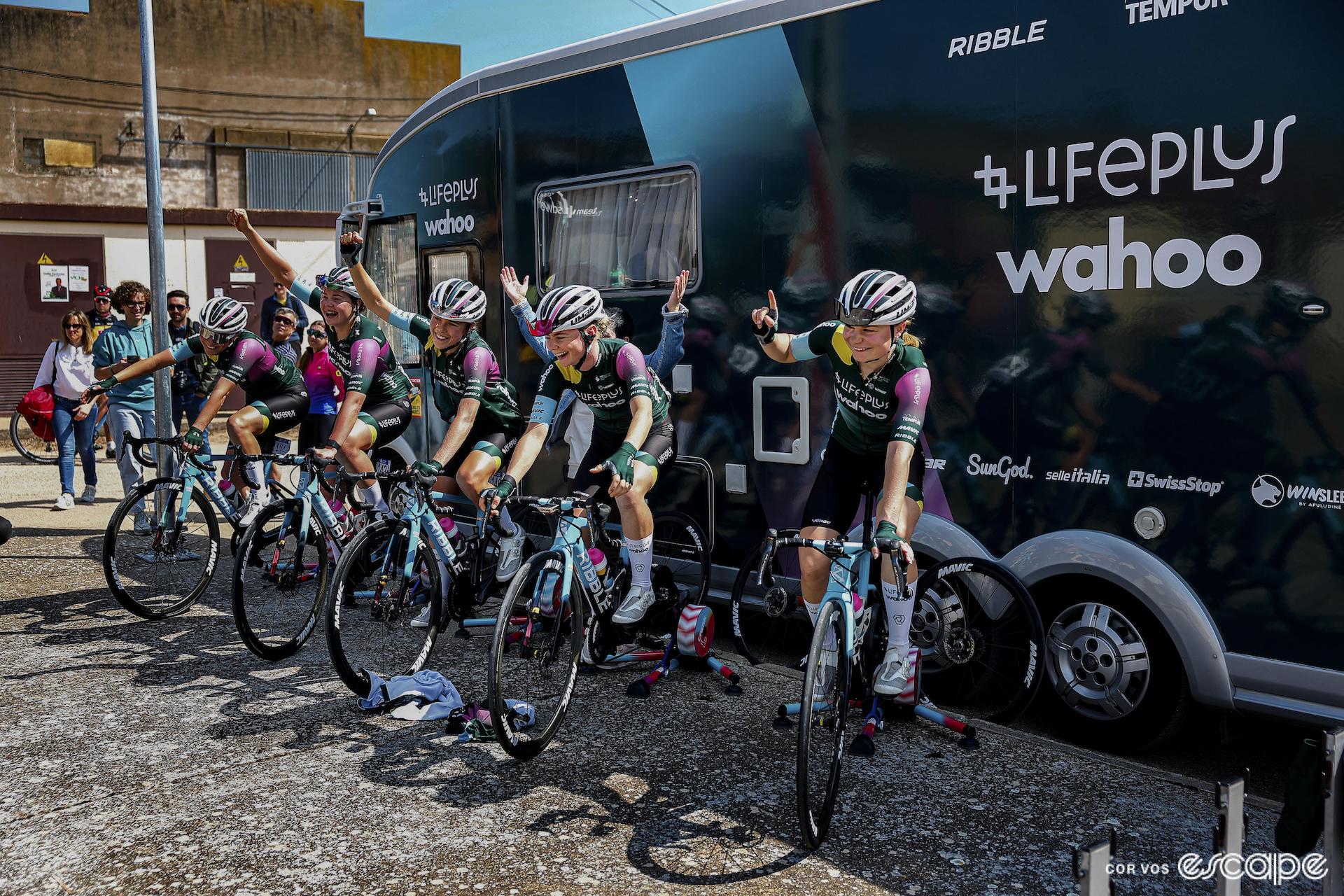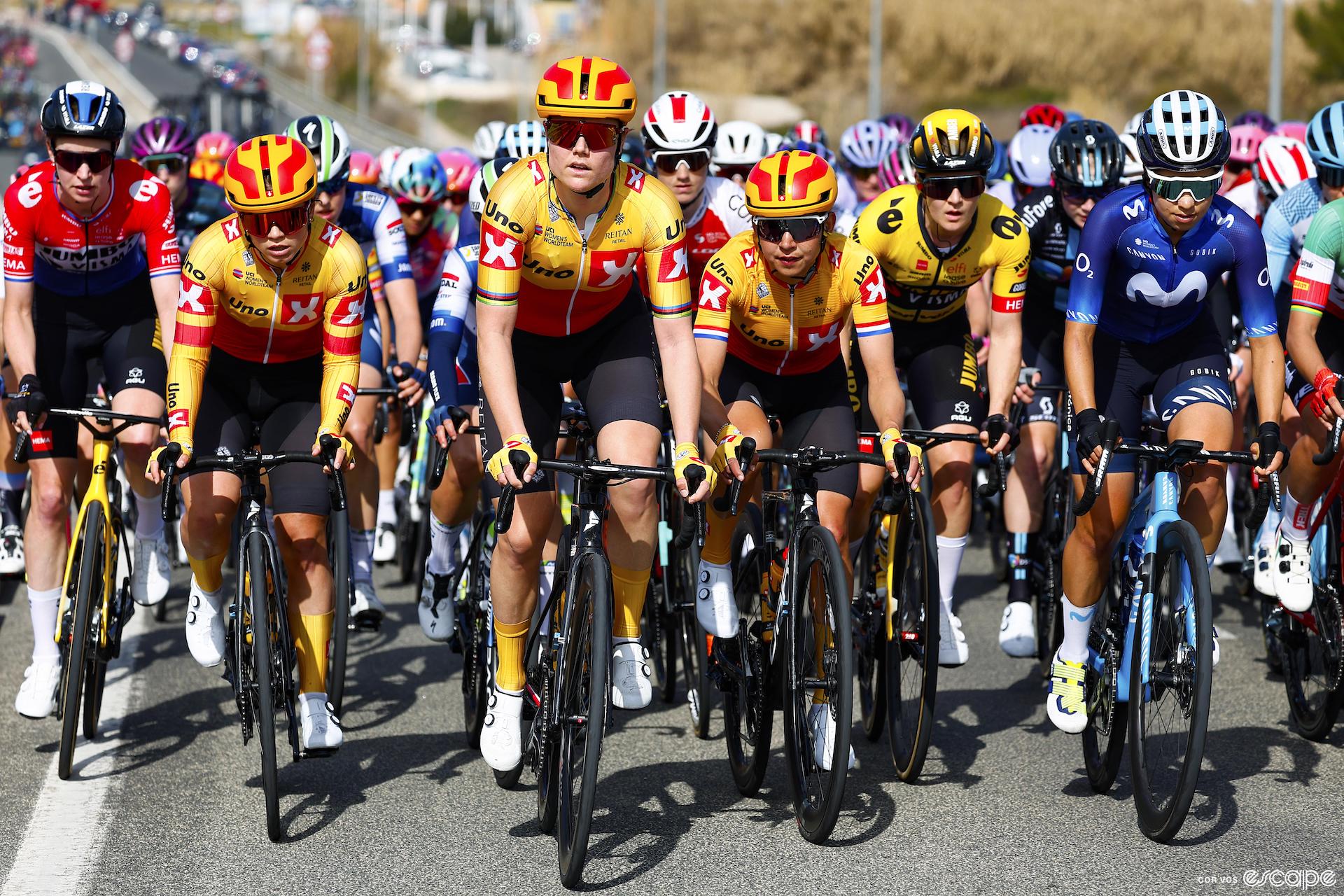The UCI’s new WorldTour relegation system caused some chaos in the men’s peloton in 2022, and a year later it’s impacting the women’s as well. Top WorldTeams like SD Worx, Trek-Segafredo, and FDJ-Suez aren’t too fussed about the new system, but others – like Uno-X, Liv Racing TeqFind, Human Powered Health, and Israel-Premier Tech Roland – are feeling the pressure.
As of May, after a string of Spanish stage races including La Vuelta Femenina, Itzulia Women, and Vuelta a Burgos, a few Women’s WorldTour outfits find themselves outside of the cutoff to be a top-ranked team in 2024. But what is the relegation system and how does it work?
How it started
The Women’s WorldTour was introduced in 2020 with eight teams and has since grown to 15. In the first year every team that applied was granted status; SD Worx, then racing as Boels-Dolmans, opted to remain Continental in 2020 but did join in 2021. A (since rescinded) rule stating a team had to be at least a year old before making the leap to WorldTeam kept Jumbo-Visma out of the top tier in its first season, 2021.
Some teams were initially cautious about stepping up because of costs. In order to obtain a WT license teams would have to pay their riders a minimum wage and have certain resources like staff in place. Non-WT teams do not have requirements when it comes to salary, insurance, etc.
But for the 2023 season, more teams applied to the WorldTour than there were spots available, with AG Insurance-Soudal Quick-Step ultimately denied a WWT license.
How relegation will work
Teams who joined the WT in 2020 were granted four-year licenses, with shorter terms for teams that joined in subsequent seasons. The upshot is all licenses are set to expire at the end of the 2023 season and UCI rankings will help determine who will be granted WWT licenses in 2024.
Teams are judged on a two-year total of points scored, from 2022 and 2023. Teams that are in the top 15 in the rankings, that apply for WWT status, and that satisfy the salary, staff, and insurance requirements, will be granted two-year licenses, which guarantees entry in 2024-2025 to races like the Giro Donne, Paris-Roubaix Femmes, and Tour de France Femmes avec Zwift. If a team ranked in the top 15 doesn’t apply, that spot drops to the next-best team that does apply. In January 2024 the ranking system resets for another two-year period that sets up the 2026 lineup.
The current situation
The current two-year points standings for the top 20 teams (WorldTour and Continental) as of May 23 paint a pretty clear picture of the situation for existing WorldTeams: who’s doing fine, who’s on the bubble, and who’s in trouble without a major turnaround in the season.

From SD Worx through Jayco-AlULa (spots 1-9), teams are in good shape and in no danger of relegation. Jayco’s 6,734 points put that team more than 1,500 clear of EF Education-Tibco-SVB.
On the bubble
EF, in 10th, is probably fine, but the top Continental team, Ceratizit-WNT, is not far behind. The German team hasn’t been seriously interested in a WorldTour license in the past, but as the series continues to develop, the long-running team may be a bit keener for access to that top tier. The outfit between them, Fenix-Deceuninck, is new to the WT for 2023 and has steadily risen in the rankings since the start of the year.
In trouble/fighting for promotion
Just below Ceratizit is Liv Racing Teqfind in 13th place. A WorldTour team, it’s being chased by AG Insurance-Soudal Quick-Step, which was denied WT status for the 2023 season even after picking up Lotta Hentala and Ashleigh Moolman-Pasio to bolster its already-strong squad. With stage racing coming up and Moolman-Pasio eyeing the Giro Donne and Tour de France Femmes, the team will likely be jumping ahead a few spots in the next months.
Sitting on the relegation line in 15th is Uno-X, one of five teams to join the WorldTour in 2022 as a brand new team, once the UCI did away with the rule about being a team for a year before obtaining a WT license. In their first year, they struggled with results, but in their second they’ve so far podiumed at Ronde van Drenthe and Festival Elsy Jacobs, and won the 1.1 GP Eco-Struct/Thompson/Security Tools one-day in Belgium with former world champion Amalie Dideriksen.
Looking below the top 15 teams, Lifeplus-Wahoo, the British team which has sent multiple riders to the WorldTour, has been vocal about its desire to join the ranks of the top teams. The team almost collapsed at the end of the 2022 season, but managed to continue and is now looking at possible promotion, only a hundred-ish points below Uno-X.

Probably out
Two other WorldTeams are firmly below the cutoff. Human Powered Health and Israel-Premier Tech Roland, both of which joined the WorldTour in 2022, are feeling the pressure to get some points, but the outlook is not good.
The only silver lining: Parkhotel Valkenburg has no interest in joining the WorldTour and it is happy to develop riders like Demi Vollering and Lorena Wiebes, both of whom previously raced with the Dutch team. But unless things change drastically, at least one of HPH or IPT is out of the WorldTour, and likely both.
What it all means
With victories in 10 of 17 WorldTour races so far this season (and on 17 of 28 WWT race days), SD Worx has been hard to beat. Trek, FDJ, DSM, Jumbo-Visma, and Movistar are the only teams to really take victories away from them so far. Not coincidentally, they’re all also in the top tier of “safe” teams.
But since gaining points at a WorldTour race is proving to be a bit harder for the teams hoping to either stay in or join the WorldTour, those teams may need to pursue different strategies, aiming to get as many riders as they can in the points at the top races or sending squads to non-WT races.
Although the strategy of targeting smaller races failed for both Lotto-DSTNY and Israel-Premier Tech in the men’s peloton last year, it’s being played again in the Women’s WorldTour; we’ve seen Uno-X at multiple lower-level races while other teams focus on the Spanish stage races. And it may meet with more success. The reason is the points spread, which offers strong incentives to hunt at lower-tier races against smaller, less-competitive fields.
| Current UCI points allocation for elite women’s road races | |||||||||||
| WorldTour races | Non-WorldTour races | ||||||||||
| Stage race stage result |
Stage race overall |
One-day result |
2.Pro stage result |
2.Pro overall |
1.Pro one-day result |
2.1 overall |
1.1 one-day result |
2.2 overall |
1.2 one-day result |
National Championships |
|
| 1st | 50 | 400 | 400 | 25 | 200 | 200 | 125 | 125 | 40 | 40 | 50 |
| 2nd | 40 | 320 | 320 | 20 | 150 | 150 | 85 | 85 | 30 | 30 | 30 |
| 3rd | 30 | 260 | 260 | 25 | 125 | 125 | 70 | 70 | 25 | 25 | 20 |
| 4th | 25 | 220 | 220 | 12 | 100 | 100 | 60 | 60 | 20 | 20 | |
| 5th | 20 | 180 | 180 | 10 | 85 | 85 | 50 | 50 | 15 | 15 | |
| 6th | 18 | 140 | 140 | 8 | 70 | 70 | 40 | 40 | 10 | 10 | |
| 7th | 15 | 120 | 120 | 6 | 60 | 60 | 35 | 35 | 5 | 5 | |
| 8th | 10 | 100 | 100 | 4 | 50 | 50 | 30 | 30 | 3 | 3 | |
| 9th | 8 | 80 | 80 | 40 | 40 | 25 | 25 | 3 | 3 | ||
| 10th | 6 | 68 | 68 | 30 | 35 | 20 | 20 | 3 | 3 | ||
| (Ends at top 10) | (Ends at 40th) | (Ends at 40th) | (Ends at 8th) | (Ends at 30th) | (Ends at 30th) | (Ends at 25th) | (Ends at 25th) | (Ends at 10th) | (Ends at 10th) | (Ends at 3rd) | |
Earlier in the season, for example, AG Insurance-Soudal-Quick Step secured 350 points by going one-two with Justine Ghekiere and Moolman-Pasio at the Setmana Ciclista-Volta Comunitat Valenciana 2.Pro stage race. Grace Brown won FDJ-Suez 250 points by winning the 2.1 Bretagne Ladies Tour and the 1.1 Grand Prix du Morbihan.
Human Powered Health skipped the string of Spanish WT stage races altogether and has been sending riders to lower-level races instead, but without much success so far. Israel-Premier Tech took the opposite tactic, sending its team to the top races and consistently sending riders off the front on each stage, throwing everything at the wall for points. It hasn’t been going much better.
But it makes sense that Human Powered Health would rather target a win a 1.1 in France (125 points) than send a full team to Spain in the hopes of getting a WT stage win (50). Even targeting a high overall placing, you need a strong stage race to top a win in a 1.1 event.
At La Vuelta Femenina the top rider on a team in trouble was Mavi García (Liv Racing TeqFind) in ninth, only gaining 80 points. The same weekend Israel-Premier Tech was fighting for scraps in Spain, Uno-X’s Dideriksen got the team 125 points in Belgium by winning the 1.1 GP Eco-Struct. Which brings us to an excellent test case this weekend.
Internationale Lotto Thüringen Tour vs. RideLondon
Two major women’s events will take place in the same week with Internationale Lotto Thüringen Tour, which started Tuesday, and the three-day RideLondon Classique starting Friday. Thüringen is a 2.Pro event, while RideLondon is part of the WorldTour.
Interestingly, SD Worx opted to skip the British WorldTour race in favour of the six-day event in Germany. Lorena Wiebes, who won all three stages of RideLondon for DSM in 2022, is instead racing in Germany alongside two-time Tour of Flanders winner Lotte Kopecky.
In the case of SD Worx, you have to guess the decision is not points-related, but more about which event will better prepare the team for the upcoming stage races. At six stages long, Thüringen is only one shorter than La Vuelta, and offers a great opportunity to see how the body does with a longer race like the nine-day Giro, especially for riders like Kopecky who have been focused on one-day events all year.
They’re not the only ones focused on the lower-ranked race. AG Insurance-Soudal Quick-Step, Fenix-Deceuninck, and Jayco-AlUla are all racing Thüringen but not RideLondon, while Canyon-SRAM sent a team to both. That’s bad news for teams that targeted Thüringen as a chance to soak up points. Sure enough, SD Worx won the opening three stages (going 1-2-3 and 1-2 on the two road stages, no less) and has a lock on the podium so far as well.
Things are (slightly) easier at RideLondon, where Canyon-SRAM , DSM, and Trek are fielding strong teams. It makes for an interesting situation, as well as strengthening Thüringen’s case for a WorldTour calendar spot in 2024. It’s also a tantalizing opportunity for Israel-Premier Tech, Lifeplus-Wahoo, and Uno-X. With a few of the top teams elsewhere and juicy WorldTour points on the line, they could definitely walk away from the weekend having made gains in the relegation battle.
What did you think of this story?

